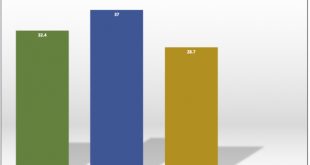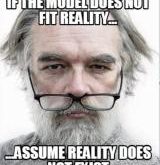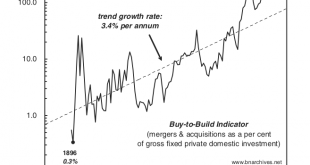from Dean Baker The Democratic presidential campaign has taken a strange twist in recent days, with candidates being asked whether we should have billionaires. While there may be some grand philosophical questions at stake here, I will stick to more mundane economic ones. The real question is: How do you want the economy to work? The basic story is that if we have a market economy, some people can get very rich. If we buy the right-wing story, the superrich got their money from their...
Read More »Predictions and projections
I have a piece in The Conversation arguing against the common practice of publishing projections, based on holding constant parameters that are unlikely to remain so in practice. I suggest modellers need to bite the bullet, make predictions and stand by them. A slight clarification, arising from discussion. To the extent that we are concerned with policy, it’s fine to make conditional predictions about the consequences of alternative policy packages. Share this:Like this:Like...
Read More »“That makes me smart”
from David Ruccio Emmanuel Saez and Gabriel Zucman begin their new book, The Triumph of Injustice: How the Rich Dodge Taxes and How to Make Them Pay, with the moment in 2016 during the first presidential election debate between Donald Trump and Hillary Clinton when the former Secretary of State challenged the reality-show celebrity about how little he had paid in federal income taxes over the years. Trump proudly admitted it: “That makes me smart.” And Clinton, for all her carefully...
Read More »Open thread Nov.19, 2019
Woke
The use of “woke” as a term of abuse by rightwingers has expanded rapidly in the recent past. A typical example is Deputy PM McCormack’s claim (rapidly refuted by fire chiefs) that the supposed relationship between climate change and the bushfire disaster arose from “the ravings of some pure, enlightened and woke capital-city greenies.” This is striking for a couple of reasons. First, I’ve never seen anyone in Australia describe themselves as “woke”. That’s not surprising: the term...
Read More »Why Wall Street shorts economists and their DSGE models
from Lars Syll Very few Wall Street firms find the DSGE models useful … This should come as no surprise to anyone who has looked closely at the models. Can an economy of hundreds of millions of individuals and tens of thousands of different firms be distilled into just one household and one firm, which rationally optimize their risk-adjusted discounted expected returns over an infinite future? There is no empirical support for the idea. Indeed, research suggests that the models perform...
Read More »Graphics from 4 empirical muckrakers – 1. Nitzan and Bichler’s Buy-to-Build Indicator
from Blair Fix During the 1990s, corporate mergers became part of the public zeitgeist. But what is the deep history of mergers and acquisitions? Jonathan Nitzan and Shimshon Bichler piece together the puzzle with their ‘buy-to-build’ indicator. This indicator measures the dollar value of mergers and acquisitions expressed as a percentage of gross fixed investments. It tells us how much corporations are spending on buying other companies, relative to how much they are spending on...
Read More »Open thread Nov. 16. 2019
“Are Robots Stealing Your Job?” is the Wrong Question
Andrew Yang says, “Yes, Robots Are Stealing Your Job” in an op-ed at the New York Times. Paul Krugman thinks they’re not and advises, “Democrats, Avoid the Robot Rabbit Hole.” This is, of course, a classic case of asking the wrong question. The real question is: will robots burn down your house and kill your grandchildren? Let’s imagine that all those self-driving trucks and the computers needed to guide them will run on electricity generated by wind...
Read More »IPA unsure about free speech (repost from 2014)
Share this:Like this:Like Loading...
Read More » Heterodox
Heterodox



